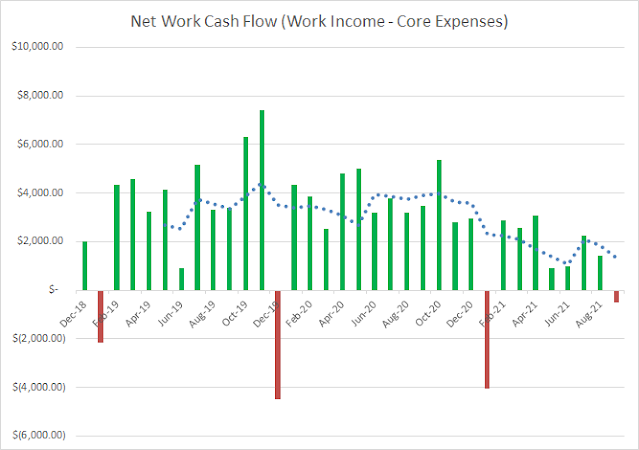Budget Check & Cash Flow Update - September 2021
 |
| Budget Check & Cash Flow Update - September 2021 |
The saying goes that cash is king. While that's true, a more accurate saying when it comes to finances is that CASH FLOW is king. Whether you're retired, still working or just starting out the only way you can improve your financial house is to have positive cash flow.
If you're in the accumulation phase then that positive cash flow allows you to save and invest to build up your future cash flow. If you're already retired, or FIREd, then congratulations because I'm sure your cash flow is well above what you need.
When it comes to personal finance it's rather simple: income - expenses = savings and savings x investing x time = financial independence. There's obviously two main levers there and while we'd all like to increase our income, many times reducing expenses is some of the low hanging fruit that you can go after to increase your savings.
Budget Check
Total income for September was excellent with $7,822.27 coming into our accounts. Even better is that's above the TTM average of $6,848.97 which includes the various COVID stimulus payments. The bulk of my income, ~71%, came from my day job, le sigh; although that should come as no surprise since we're still in the accumulation phase. Dividends were the next largest income source at 16% with a hefty $1,241 for the month.
Total expenses for September were out of control if you just look at the numbers on the surface coming in at $7,068.27. Ooooof!!! That's primarily due to us switching car and home owners insurance providers and paying the full 6 month/12 month premiums at once. So future months should be lower since those expenses won't be there, but it definitely hurt in September. On average though our monthly expenses will be lower thanks to this swap. There was also a quick getaway that we paid for in September as well which added to the total expenses. The TTM average total monthly expenses are $4,619.80 which is still higher than I'd like, but it's manageable all things considered.
Core expenses were also effected by the large insurance payments that we made. September's core expenses came to $6,032.48. The TTM average core expenses $3,325.81 but there's a lot of noise in those numbers thanks to the insurance payments that will even out over time.
For the month we ended up with a net positive cash flow of $753.70 when looking at all income sources. Based on just work income, but including all expenses, the net cash flow came to -$1,534.96. Whoops!
Our savings rate from all income sources came to 10% while our savings rate from work income alone was -28%. The savings rates are all based off of net take home pay and don't include the pre-tax savings towards my 401k or HSA or the post-tax ESPP withholding.
*A few notes about the cash flow check in. All income is only income that I receive and does not include my wife's income likewise for the expenses. We've found it's easiest for us to just keep separate accounts since I'm gone most of the time for work. Also, pre-tax withholding for the 401k (I currently withhold 7% in order to get the full 5% employer match) and the ESPP through my employer (4% post tax withholding) are not included in the above savings amount.
Net Work Cash Flow
While my net cash flow above includes all income and all expenses, I wanted to get a more granular look at the cash flow that is available each month. So I started calculating my Net Work Cash Flow which is calculated as post-tax income only from my work and core expenses. Think of it more like a free cash flow for a business.
The above might be the true cash flow each month; however, it's not really representative of our "free cash flow" each month. The idea is that all other income sources outside of work income are already going directly into savings or investing or in the case of dividends remaining in the brokerage account. On the expense side the majority of our expenses fall into the core side and most of the other expenses are completely discretionary spending.
I believe this gives a better idea of our "free" cash flow from "normal operations" each month that can/will be used for debt reduction, saving and investing.
My net work cash flow was negative for September due to the aforementioned insurance premium payments. Net work cash flow came to -$498.87 during September; although the TTM average is still solid at $1,721.51.
Non-Work Cash Flow
Passive income for September totaled $1,253.07 and covered 20.8% of core expenses. Meanwhile, non-work income totaled $2,288.66 and covered 37.9% of core expenses for September.
Conclusion
Despite the small positive cash flow and small net work cash flow, September was still a successful month. The increased expenses were primarily due to paying the full 6 mo and 12 mo premiums for our car and homeowner's insurance. While that hurts for September it will increase monthly cash flow on average by over $300. Side note if you haven't shopped your insurance in the last few years stop reading now and go do it!
Refinancing the mortgage on our house is likely the next kind of big savings that we could potentially do. Some of the quotes that I've seen have our monthly payment dropping by anywhere between $150 and $250 which is a pretty good savings and allows more cash to be funneled towards investing or the potential purchase of some land that we've been searching for.
Make sure you sign up to receive new posts to your email so you don't miss anything. And be sure to follow me on Twitter @JC_PIP to get up to the minute news of purchases for my portfolio or if you prefer Pinterest or Facebook I'm on there too.
How often do you shop around your insurance? If you've completed a refinance in the last year or so was it relatively easy and pain free? What are you working on to lower expenses or increase your income?



Comments
Post a Comment